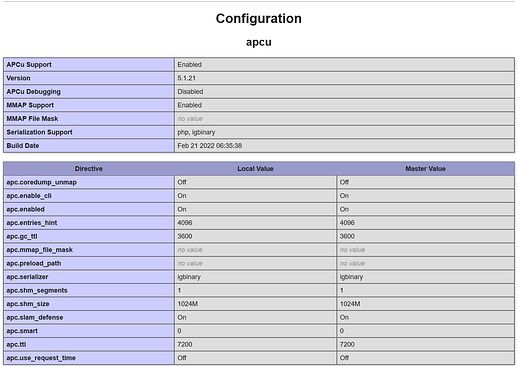I use PHP packages from Ondrej Sury maintainer of PHP in Debian. My configuartion is based on Carsten Rieger’s tutorial and I haven’t had any of the issues that keep popping up here in the forums…
Click me
4. PHP-FPM and Redis-Server
4.1 Install packages and configure PHP
Install the required packages:
apt update -q4 && apt install -y redis-server libapache2-mod-php8.0 php8.0-{fpm,gd,mysql,curl,xml,zip,intl,mbstring,bz2,ldap,apcu,bcmath,gmp,imagick,igbinary,redis,smbclient,cli,common,opcache,readline,imagick,redis} imagemagick unzip
Backup all configuration files:
cp /etc/php/8.0/fpm/pool.d/www.conf /etc/php/8.0/fpm/pool.d/www.conf.bak
cp /etc/php/8.0/fpm/php-fpm.conf /etc/php/8.0/fpm/php-fpm.conf.bak
cp /etc/php/8.0/cli/php.ini /etc/php/8.0/cli/php.ini.bak
cp /etc/php/8.0/fpm/php.ini /etc/php/8.0/fpm/php.ini.bak
cp /etc/php/8.0/fpm/php-fpm.conf /etc/php/8.0/fpm/php-fpm.conf.bak
cp /etc/php/8.0/mods-available/apcu.ini /etc/php/8.0/mods-available/apcu.ini.bak
cp /etc/ImageMagick-6/policy.xml /etc/ImageMagick-6/policy.xml.bak
Set the time zone for the operating system:
To list all available time zones, you can either list the files in the /usr/share/zoneinfo directory or invoke the timedatectl command with the list-timezones option:
timedatectl set-timezone Europe/Zurich
Set the time zone for the PHP configuration:
A list with all supported time zones is available here: PHP: List of Supported Timezones - Manual
sed -i 's/;date.timezone.*/date.timezone = Europe\/\Zurich/' /etc/php/8.0/cli/php.ini
sed -i 's/;date.timezone.*/date.timezone = Europe\/\Zurich/' /etc/php/8.0/fpm/php.ini
Calaculate the PHP-FPM Tweaks:
AvailableRAM=$(awk '/MemAvailable/ {printf "%d", $2/1024}' /proc/meminfo)
AverageFPM=$(ps --no-headers -o 'rss,cmd' -C php-fpm8.0 | awk '{ sum+=$1 } END { printf ("%d\n", sum/NR/1024,"M") }')
FPMS=$((AvailableRAM/AverageFPM))
PMaxSS=$((FPMS*2/3))
PMinSS=$((PMaxSS/2))
PStartS=$(((PMaxSS+PMinSS)/2))
Add additional configuration parameters:
sed -i "s/;env\[HOSTNAME\] = /env[HOSTNAME] = /" /etc/php/8.0/fpm/pool.d/www.conf
sed -i "s/;env\[TMP\] = /env[TMP] = /" /etc/php/8.0/fpm/pool.d/www.conf
sed -i "s/;env\[TMPDIR\] = /env[TMPDIR] = /" /etc/php/8.0/fpm/pool.d/www.conf
sed -i "s/;env\[TEMP\] = /env[TEMP] = /" /etc/php/8.0/fpm/pool.d/www.conf
sed -i "s/;env\[PATH\] = /env[PATH] = /" /etc/php/8.0/fpm/pool.d/www.conf
sed -i 's/pm.max_children =.*/pm.max_children = '$FPMS'/' /etc/php/8.0/fpm/pool.d/www.conf
sed -i 's/pm.start_servers =.*/pm.start_servers = '$PStartS'/' /etc/php/8.0/fpm/pool.d/www.conf
sed -i 's/pm.min_spare_servers =.*/pm.min_spare_servers = '$PMinSS'/' /etc/php/8.0/fpm/pool.d/www.conf
sed -i 's/pm.max_spare_servers =.*/pm.max_spare_servers = '$PMaxSS'/' /etc/php/8.0/fpm/pool.d/www.conf
sed -i "s/;pm.max_requests =.*/pm.max_requests = 1000/" /etc/php/8.0/fpm/pool.d/www.conf
sed -i "s/allow_url_fopen =.*/allow_url_fopen = 1/" /etc/php/8.0/fpm/php.ini
sed -i "s/output_buffering =.*/output_buffering = 'Off'/" /etc/php/8.0/cli/php.ini
sed -i "s/max_execution_time =.*/max_execution_time = 3600/" /etc/php/8.0/cli/php.ini
sed -i "s/max_input_time =.*/max_input_time = 3600/" /etc/php/8.0/cli/php.ini
sed -i "s/post_max_size =.*/post_max_size = 10240M/" /etc/php/8.0/cli/php.ini
sed -i "s/upload_max_filesize =.*/upload_max_filesize = 10240M/" /etc/php/8.0/cli/php.ini
sed -i "s/memory_limit = 128M/memory_limit = 1024M/" /etc/php/8.0/fpm/php.ini
sed -i "s/output_buffering =.*/output_buffering = 'Off'/" /etc/php/8.0/fpm/php.ini
sed -i "s/max_execution_time =.*/max_execution_time = 3600/" /etc/php/8.0/fpm/php.ini
sed -i "s/max_input_time =.*/max_input_time = 3600/" /etc/php/8.0/fpm/php.ini
sed -i "s/post_max_size =.*/post_max_size = 10240M/" /etc/php/8.0/fpm/php.ini
sed -i "s/upload_max_filesize =.*/upload_max_filesize = 10240M/" /etc/php/8.0/fpm/php.ini
sed -i "s/;session.cookie_secure.*/session.cookie_secure = True/" /etc/php/8.0/fpm/php.ini
sed -i "s/;opcache.enable=.*/opcache.enable=1/" /etc/php/8.0/fpm/php.ini
sed -i "s/;opcache.enable_cli=.*/opcache.enable_cli=1/" /etc/php/8.0/fpm/php.ini
sed -i "s/;opcache.memory_consumption=.*/opcache.memory_consumption=128/" /etc/php/8.0/fpm/php.ini
sed -i "s/;opcache.interned_strings_buffer=.*/opcache.interned_strings_buffer=8/" /etc/php/8.0/fpm/php.ini
sed -i "s/;opcache.max_accelerated_files=.*/opcache.max_accelerated_files=10000/" /etc/php/8.0/fpm/php.ini
sed -i "s/;opcache.revalidate_freq=.*/opcache.revalidate_freq=1/" /etc/php/8.0/fpm/php.ini
sed -i "s/;opcache.save_comments=.*/opcache.save_comments=1/" /etc/php/8.0/fpm/php.ini
sed -i "s|;emergency_restart_threshold.*|emergency_restart_threshold = 10|g" /etc/php/8.0/fpm/php-fpm.conf
sed -i "s|;emergency_restart_interval.*|emergency_restart_interval = 1m|g" /etc/php/8.0/fpm/php-fpm.conf
sed -i "s|;process_control_timeout.*|process_control_timeout = 10|g" /etc/php/8.0/fpm/php-fpm.conf
sed -i '$aapc.enable_cli=1' /etc/php/8.0/mods-available/apcu.ini
sed -i "s/rights=\"none\" pattern=\"PS\"/rights=\"read|write\" pattern=\"PS\"/" /etc/ImageMagick-6/policy.xml
sed -i "s/rights=\"none\" pattern=\"EPS\"/rights=\"read|write\" pattern=\"EPS\"/" /etc/ImageMagick-6/policy.xml
sed -i "s/rights=\"none\" pattern=\"PDF\"/rights=\"read|write\" pattern=\"PDF\"/" /etc/ImageMagick-6/policy.xml
sed -i "s/rights=\"none\" pattern=\"XPS\"/rights=\"read|write\" pattern=\"XPS\"/" /etc/ImageMagick-6/policy.xml
Disable mpm_prefork, enable php-fpm with mpm_event and restart all relevant services:
systemctl restart php8.0-fpm
a2dismod php8.0 && a2dismod mpm_prefork
a2enmod proxy_fcgi setenvif mpm_event
systemctl restart apache2
a2enconf php8.0-fpm
systemctl restart apache2 && systemctl restart php8.0-fpm
4.2 Configure Redis
Backup the Redis configuration file:
cp /etc/redis/redis.conf /etc/redis/redis.conf.bak
Adjust the configuration:
sed -i "s/port 6379/port 0/" /etc/redis/redis.conf
sed -i s/\#\ unixsocket/\unixsocket/g /etc/redis/redis.conf
sed -i "s/unixsocketperm 700/unixsocketperm 770/" /etc/redis/redis.conf
sed -i "s/# maxclients 10000/maxclients 512/" /etc/redis/redis.conf
usermod -aG redis www-data
Backup the file sysctl.conf:
cp /etc/sysctl.conf /etc/sysctl.conf.bak
Set avm.overcommit_memory to a value of 1:
sed -i '$avm.overcommit_memory = 1' /etc/sysctl.conf
4.3 Reboot your server!
Reboot your server:
reboot


